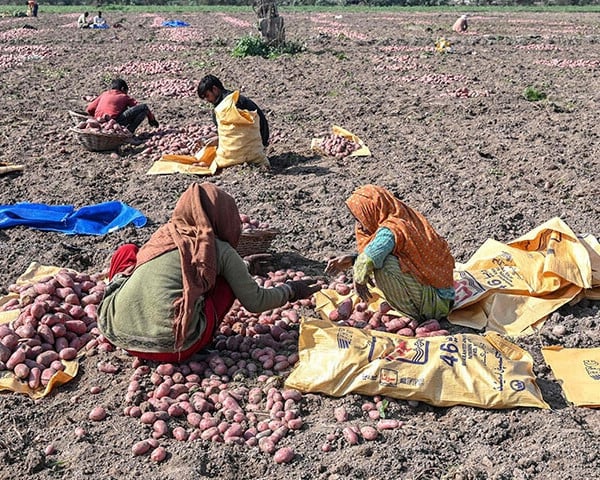Tags
Over 40% drop in rainfall ravages crops in Punjab.
The drought is not isolated to Punjab; Sindh saw a 52% reduction in rainfall, while Balochistan experienced a 45% drop.

A severe winter drought is wreaking havoc on crops across Punjab, Pakistan’s agricultural heartland, with the region experiencing a 40% drop in rainfall.
The Pakistan Meteorological Department (PMD) reported a 42% reduction in rainfall from September to mid-January, leaving farmers grappling with major financial losses.
Malik Asghar, chairman of the Punjab Fruit and Vegetable Exporters Association, highlighted the situation, saying, “The lack of rains has had a major financial impact on farmers. Normally, we would harvest 100 to 120 sacks of potatoes per acre; this year, it’s barely 60.”
Agriculture is a crucial sector for Pakistan, contributing nearly a quarter of the country’s GDP and employing 37% of the national workforce.
However, Asghar warned that many small farmers are already “giving up” and seeking jobs in urban areas as their livelihoods face mounting challenges. “This spell of dry weather will have a very adverse effect on them,” he said.The drought is not isolated to Punjab; Sindh saw a 52% reduction in rainfall, while Balochistan experienced a 45% drop.
The PMD classified January’s weather as a “mild drought” in much of Punjab, Sindh, and parts of Balochistan, predicting “flash droughts” in the warmer months.
Ishfaq Ahmad Jatt, a wheat farmer from Multan, explained that his harvest was “badly affected” by the lack of rain. He predicted a potential 50% drop in wheat production if the drought continues.
Pakistan relies heavily on the Indus River for water, but experts argue that the country’s rapid population growth, poor water management, and reliance on a single water source are exacerbating the situation.
This drought comes just two years after record monsoon rains caused catastrophic floods that left a third of the country submerged. The country also suffers from thick winter smog, worsened by the drought, which traps pollution close to the ground, leading to hazardous air quality.
Pakistan ranks among the countries most vulnerable to climate change, and experts warn that such extreme weather events will only become more frequent and severe.
With crop failures and worsening air quality, the country’s agricultural sector faces an uncertain future as farmers are now calling for urgent action to address water scarcity and invest in more sustainable agricultural practices.
https://tribune.com.pk/story/2524058/over-40-drop-in-rainfall-ravages-crops-in-punjabPublished Date: January 26, 2025






